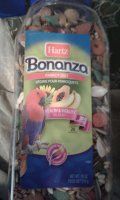It's an issue most commonly seen in *small* species.... i.e. budgies, cockatiels, parrotlets, etc.
Here's a page for parrotlets...
Parrotlet Blog: Pellets & Color Mutation Parrotlets
On another forum (I think... BB?) there was an owner who jumped on the "pellet bandwagon" and fed their cockatiel an almost exclusively pelleted diet... cause, you know, pellets are so much healthier than seeds? Well, towards the end of his life (teens, plus), he had to be put on allopurinol due to kidney failure.
Here's this page for cockatiels and budgies...
Small Parrots in Health and Disease
Even my avian vet does not recommend feeding little birds more than 50% pellets. If it's a conure, pionus, poicephalus, psittacula, or larger, then pellets can make up to 75% of the diet! And seeds being a small portion of said diet. But for the little guys? Seeds are still recommended.



 Good luck with your lovebird!
Good luck with your lovebird! 